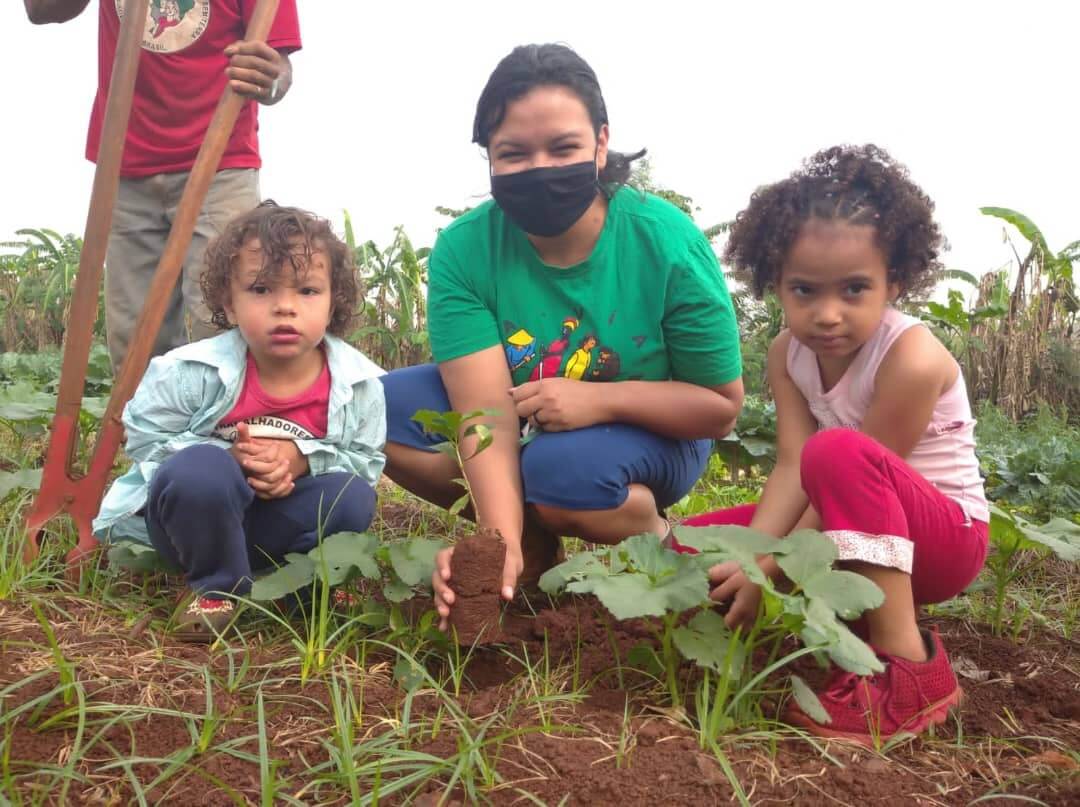Advancing Food Sovereignty Through Agroecology in Brazil

Project Information
Promoting ecological restoration and the production of healthy food toward greater food sovereignty in Brazil – with the goal of planting 100 million food-bearing trees over the next 10 years.
**Photo credit: Movimento dos Trabalhadores Rurais Sem Terra
Describe the need affecting community
The inequalities that afflict Brazilian society are enormous: a mere 1.6% of Brazilian landholders control 47% of the nation’s privately owned land, while 60% of the population shares just 15% of all wealth. Foreign companies’ control over local resources increased as Brazil continued down its ultra neo-liberal economic path. Corporations grabbed land for agribusiness, mining and huge dam projects, subjecting local communities to violence. Extreme government policies eroded environmental and labor protections won through years of popular struggle. The impact on Brazil’s rural communities and the nation’s vast forests, land, water systems and biodiversity is devastating.
Environmental degradation and deforestation has worsened rapidly. In the first month of 2022, 430 square kilometers were under alert for deforestation, 420% more than the same period the prior year. By mid-May, more than 4,000 fires had been reported in the Cerrado (the world’s most biodiverse savannah), a 20% increase over the same period the previous year. The advance of agribusiness is a principal driver of the destruction of land and negative impacts on the lives of peasants and Indigenous communities. Agribusiness expands through fires, intimidation and destruction of family agriculture, attacking what communities need for their survival. The main objective of the attacks is to make space for monoculture plantations for profit.
Our partners express the need to challenge unjust policies and inequities, while creating just and sustainable alternatives like agroecology and food sovereignty.
How will this Advance project help to address the need?
Brazil’s Landless Workers Movement (MST) promotes agroecology, cooperative organization, and protection of the environment and agricultural biodiversity. This model increased autonomy, reducing dependence on external inputs and implementing the principles of food sovereignty. La Via Campesina, of which MST is a member, defines food sovereignty as “the right of peoples to healthy and culturally appropriate food produced through ecologically sound and sustainable methods, and their right to define their own food and agriculture system.” To encourage widespread use of agroecological techniques like terracing, diversification, soil conservation, and seed saving, the MST trains “agroecology technicians” to educate and build awareness of the importance of adopting practices to ensure long-term environmental health and sustainable livelihoods.
Describe the primary goal of the project
In January 2020, the MST launched the National Plan to Plant Trees, Produce Healthy Food, which is a mobilization of agrarian reform encampments and settlements throughout Brazil to promote ecological restoration and the production of healthy food, with the goal of planting 100 million trees over the next 10 years. The MST organizes landless farmers to occupy misused or underutilized land to grow food. Currently, there are approximately 900 encampments with 150,000 landless families in Brazil, who are organizing for the official recognition of their collective land rights under the Brazilian constitution. Once encampments are officially recognized by the Brazilian government and granted land titles, they become settlements. In four decades, the MST has organized more than 2,500 land occupations, and successfully secured land for over 370,000 families on 17 million acres.
Describe the change you would like to see in the community as a result of this Advance project
Ongoing training will encourage the exchange of wisdom and knowledge. This will include organizing the Second National Course for the Development of the National Plan to Plant Trees, Produce Healthy Foods, building on the experience of the first course which occurred in 2022. The course will take place at the National Florestan Fernandes School in São Paulo over ten days. It will have around 35 participants from agrarian reform areas from around the country. During the course, there will be time dedicated to evaluation of past campaign actions to understand and mitigate mistakes and build on successes.
Participants of the National Course will be committed and responsible for sharing what they learn with people in the encampments and settlements where they live, multiplying the knowledge of agroforestry and putting it into practice. Prior to the implementation, they will hold preparatory conversations in the encampments and settlements to exchange knowledge and begin discussing agroforestry implementation. There will be a National Tree Planting Day, when seedlings produced by the MST’s network of nurseries will be planted at the same time in different agrarian reform areas across Brazil. Agricultural sciences professionals will provide technical advice.
The project’s impact over the next year is expected to reach 3,500 people living in popular agrarian reform areas.

